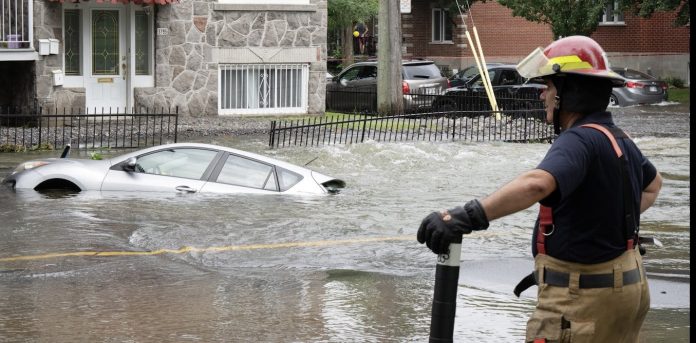Global crises are multiplying: Here’s how science can help our public decision-makers
Housing, climate, cost of living, health — the multitude of interconnected crises the world is facing has spawned a new term: “polycrisis.”
The World Economic Forum’s Global Risks 2023 report defines this as a situation “where disparate crises interact such that the overall impact far exceeds the sum of each part.” The report describes the cost of living crisis as the most immediate global risk, and the climate crisis as the greatest future threat the world is facing.
When one adds growing social and political polarization (increasingly fuelled by misinformation and disinformation campaigns) to this, as well as depleting food and energy reserves, weak economic growth and increasing geopolitical confrontation and unrest, the result is a world on the brink of catastrophe.
As a result, it is urgent for the Scientific Council — which synthesizes the best scientific evidence available for parliamentarians and members of government — to have more evidence at its disposal so it can carry out its mission. This is the only way it can provide guidance to public authorities as they grapple with new realities.
We are, respectively, a professor at McMaster University and co-lead of the Global Commission on Evidence, and a professor of political science at Université Laval and executive director of the new Réseau francophone international en conseil scientifique (RFICS). We have been working for several decades to improve the integration of scientific research into public policymaking.
A crying need for evidence
In early May, we attended the fifth International Conference on Science Advice to Governments (INGSA), in Kigali, Rwanda. This meeting brought together scientific advisory experts to discuss the growing importance of using evidence in policymaking. According to INGSA, our post-COVID world, disrupted by climate change and the digital transformation, makes the need for scientific advisors more urgent than ever.

This year, RFICS, whose mission is to strengthen the capacity of scientific advice to governments and parliaments in the French-speaking community at local, provincial, national and international levels, joined the Implementation Council of the Global Commission on Evidence, which brings together more than 70 organizations.
RFICS has Canadian roots, as does the Global Commission on Evidence, which was founded in 2021 as a grassroots effort — a movement initiated by academic, non-governmental and citizen organizations — to improve the use of research evidence in good times as in bad. The commission documented progress in the use of evidence in its latest annual report, Update 2024.

The Commission’s work identified promising ways to increase the use of evidence, including five ways of combating ignorance about it during and after the COVID-19 pandemic.
In particular, they stressed how it important it was to stop running after the latest studies on issues and, instead, focus on information derived from continuously updated summaries of evidence. They also stressed the need to stop accepting the personal opinions of media experts. As an alternative, they recommend favouring those who can back up their statements with a detailed description of how they identify, evaluate and interpret the evidence on which their advice is based.
Policy based on evidence
Here are five ways governments can rely more on evidence to tackle the many threats we face:
1) Ask scientific advisors to “show their work”: Scientific advisors must address public decision-makers, whether parliamentarians or members of government, by providing accurate and verifiable information about their work. Acting as “general contractors” — an analogy borrowed from the construction industry — they could co-ordinate all the activities required to provide the best available scientific evidence for use. Like an orchestra conductor, they could adopt different “instruments,” as required, to provide evidence-based support.
2) Going beyond traditional, ad hoc advisory tables: Expert engagement processes can be designed to make effective use of a wide range of expertise, as opposed to processes where “old pals get together around a table.”
3) Rather than making the system work for the evidence, create a system based on the evidence: An evidence-based support system can be formalized and strengthened (or transformed, like research and innovation systems), and should not depend on isolated advocates or isolated centres of expertise. In a given country or sector, this system should be able to reliably provide all the forms of evidence needed to answer a specific question when someone needs it, in the form required, taking into consideration all the necessary questions about the timeliness, quality, and local applicability (including for groups that deserve special attention in terms of equity) of the evidence.
4) Tailor evidence to the question being asked rather than favouring certain forms of evidence: Data analytics, evaluation and behavioural insights are three useful forms of evidence among others (not universal remedies). Adapting various forms of evidence to a specific need (with the help of the MECE method — an acronym for “mutually exclusive and collectively exhaustive” — which helps to avoid duplication and ensure that nothing is overlooked) and highlighting fairness considerations when examining evidence (and gaps) are key aspects of the “general contractor” model.
5) Implement a continuous cycle of knowledge production: Sharing capabilities is essential. An evidence-based support system has three components: ultra-rapid evidence-based support (in one to 10 working days), the “general contractor” model (with citizen partners), and living evidence syntheses (with downloadable data sets), all of which are major innovations.
It is worth remembering that, as with public policy, scientific advice to parliamentarians and decision-makers benefits from being based on solid data and evidence. After the Kigali Conference, scientific advice experts could explore ways of systematically integrating validated and reliable data into their analyses while taking account its local applicability. Ultimately, this could help to develop better-informed policies, thereby strengthening public confidence in the decisions of their representatives and governments.![]()
John N. Lavis, Professor and Canada Research Chair in Evidence-Support Systems, McMaster University and Mathieu Ouimet, Professor in Political Science, Université Laval
This article is republished from The Conversation under a Creative Commons license. Read the original article.



